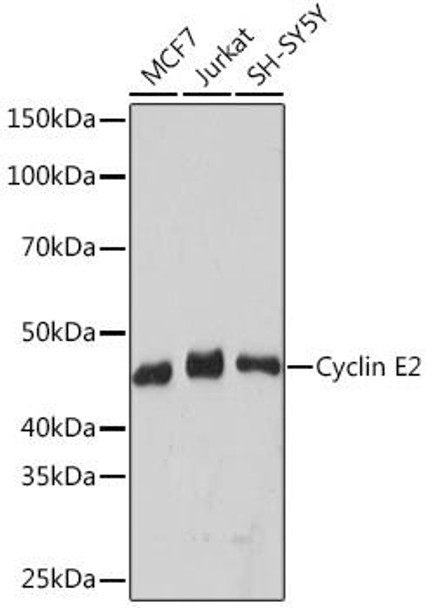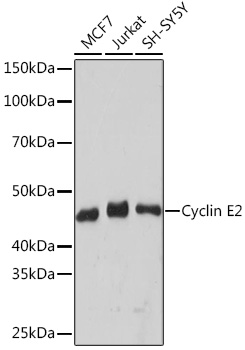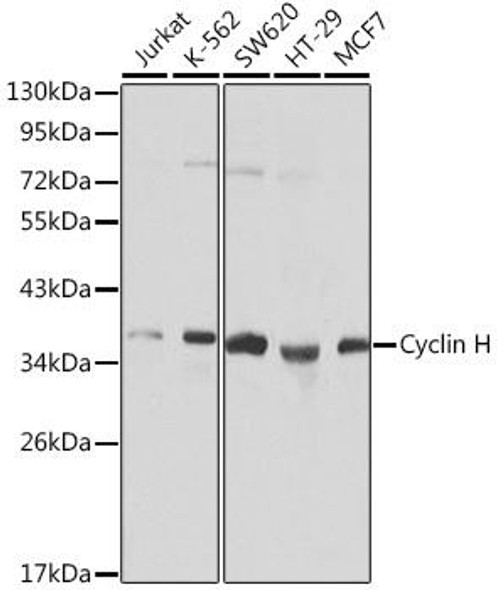Description
Anti-Cyclin E2 Antibody (CAB9305)
The Cyclin E2 Rabbit Monoclonal Antibody (CAB9305) is a vital tool for researchers studying cell cycle regulation and cancer biology. Cyclin E2 is a key regulatory protein involved in the progression of the cell cycle, specifically in the G1/S transition. This antibody, generated in rabbits, exhibits high specificity and sensitivity for detecting Cyclin E2 in human samples through Western blot analysis.Cyclin E2 is known to interact with cyclin-dependent kinases and play a crucial role in cell division and proliferation. Dysregulation of Cyclin E2 expression has been implicated in various types of cancer, making it a promising target for cancer therapy development.
By accurately detecting Cyclin E2 levels, researchers can gain insights into the mechanisms underlying tumorigenesis and potentially identify novel therapeutic strategies for cancer treatment.The Cyclin E2 Rabbit Monoclonal Antibody (CAB9305) is a reliable tool for researchers investigating the role of Cyclin E2 in cancer progression and other diseases related to cell cycle dysregulation. Its high specificity and sensitivity make it an essential reagent for studies aiming to elucidate the molecular mechanisms governing cell cycle progression and identify potential therapeutic targets.
| Antibody Name: | Anti-Cyclin E2 Antibody |
| Antibody SKU: | CAB9305 |
| Antibody Size: | 20uL, 50uL, 100uL |
| Application: | WB |
| Reactivity: | Human |
| Host Species: | Rabbit |
| Immunogen: | A synthesized peptide derived from human Cyclin E2 |
| Application: | WB |
| Recommended Dilution: | WB 1:500 - 1:2000 |
| Reactivity: | Human |
| Positive Samples: | MCF7, Jurkat, SH-SY5Y |
| Immunogen: | A synthesized peptide derived from human Cyclin E2 |
| Purification Method: | Affinity purification |
| Storage Buffer: | Store at -20'C. Avoid freeze / thaw cycles. Buffer: PBS with 0.02% sodium azide, 0.05% BSA, 50% glycerol, pH7.3. |
| Isotype: | IgG |
| Sequence: | Email for sequence |
| Gene ID: | 9134 |
| Uniprot: | O96020 |
| Cellular Location: | Nucleus |
| Calculated MW: | 50kDa |
| Observed MW: | 47KDa |
| Synonyms: | CYCE2 |
| Background: | The protein encoded by this gene belongs to the highly conserved cyclin family, whose members are characterized by a dramatic periodicity in protein abundance through the cell cycle. Cyclins function as regulators of CDK kinases. Different cyclins exhibit distinct expression and degradation patterns which contribute to the temporal coordination of each mitotic event. This cyclin forms a complex with and functions as a regulatory subunit of CDK2. This cyclin has been shown to specifically interact with CIP/KIP family of CDK inhibitors, and plays a role in cell cycle G1/S transition. The expression of this gene peaks at the G1-S phase and exhibits a pattern of tissue specificity distinct from that of cyclin E1. A significantly increased expression level of this gene was observed in tumor-derived cells. [provided by RefSeq, Jul 2008] |
| UniProt Protein Function: | CCNE2: Essential for the control of the cell cycle at the late G1 and early S phase. Interacts with the CDK2 (in vivo) and CDK3 (in vitro) protein kinases to form a serine/threonine kinase holoenzyme complex. The cyclin subunit imparts substrate specificity to the complex. Activated by papilloma viral oncoproteins E6 and E7 which bind to and inactivate p53 and Rb, respectively. According to PubMed:9858585, highest levels of expression in adult testis, thymus and brain. Lower levels in placenta, spleen and colon. Consistently elevated levels in tumor- derived cells compared to non-transformed proliferating cells. According to PubMed:9840927: low levels in thymus, prostate, brain, skeletal muscle, and kidney. Elevated levels in lung. According to PubMed:9840943 highly expressed in testis, placenta, thymus and brain. In a lesser extent in small intestine and colon. Belongs to the cyclin family. Cyclin E subfamily. 2 isoforms of the human protein are produced by alternative splicing. |
| UniProt Protein Details: | Protein type:Cell cycle regulation; Activator Chromosomal Location of Human Ortholog: 8q22.1 Cellular Component: nucleoplasm; cytosol Molecular Function:protein binding; cyclin-dependent protein kinase regulator activity Biological Process: DNA replication initiation; cell division; regulation of cyclin-dependent protein kinase activity; mitotic cell cycle; cell cycle checkpoint; G1/S transition of mitotic cell cycle |
| NCBI Summary: | The protein encoded by this gene belongs to the highly conserved cyclin family, whose members are characterized by a dramatic periodicity in protein abundance through the cell cycle. Cyclins function as regulators of CDK kinases. Different cyclins exhibit distinct expression and degradation patterns which contribute to the temporal coordination of each mitotic event. This cyclin forms a complex with and functions as a regulatory subunit of CDK2. This cyclin has been shown to specifically interact with CIP/KIP family of CDK inhibitors, and plays a role in cell cycle G1/S transition. The expression of this gene peaks at the G1-S phase and exhibits a pattern of tissue specificity distinct from that of cyclin E1. A significantly increased expression level of this gene was observed in tumor-derived cells. [provided by RefSeq, Jul 2008] |
| UniProt Code: | O96020 |
| NCBI GenInfo Identifier: | 5921733 |
| NCBI Gene ID: | 9134 |
| NCBI Accession: | O96020.1 |
| UniProt Secondary Accession: | O96020,O95439, |
| UniProt Related Accession: | O96020 |
| Molecular Weight: | 404 |
| NCBI Full Name: | G1/S-specific cyclin-E2 |
| NCBI Synonym Full Names: | cyclin E2 |
| NCBI Official Symbol: | CCNE2 |
| NCBI Official Synonym Symbols: | CYCE2 |
| NCBI Protein Information: | G1/S-specific cyclin-E2 |
| UniProt Protein Name: | G1/S-specific cyclin-E2 |
| Protein Family: | G1/S-specific cyclin |
| UniProt Gene Name: | CCNE2 |
| UniProt Entry Name: | CCNE2_HUMAN |









